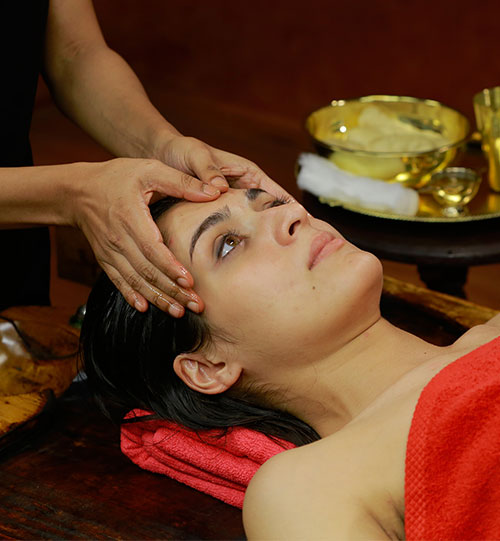About Ayurveda
Discover our passion for holistic healing and meaningful wellness journeys rooted in ancient traditions.
Nature’s Wisdom, Aligned with Your Journey
Understand Ayurveda
India’s Ancient Science of Healing
Explore the essence of Ayurveda – a holistic system of medicine rooted in nature, balance, and self-awareness. Learn about its foundational principles, powerful therapies, condition-based healing, and discover trusted Ayurvedic centres across India.
What is Ayurveda?
Discover Ayurveda – The Ancient Science of Life
Ayurveda, derived from the Sanskrit words “Ayur” (life) and “Veda” (knowledge or science), is an ancient Indian system of holistic healing that dates back more than 5,000 years. At its core, Ayurveda is not just about treating illness—it’s about living in harmony with nature and yourself, and finding balance in body, mind, and spirit.

History of Ayurveda
Ayurveda originated in the Indian subcontinent and was systematized by three great sages – Charaka, Susrutha, and Vagbhata – whose texts still form the foundation of Ayurvedic knowledge. These ancient scholars documented detailed observations of the human body, mind, health, and disease, long before the emergence of modern medicine.
During the medieval period, while foreign invasions caused disruptions across India, Kerala in South India became a sanctuary for Ayurveda. Here, practitioners preserved and evolved the science, giving birth to specialized Kerala-style therapies like Keraleeya Panchakarma.

The Philosophy Behind Ayurveda
Ayurveda is grounded in the belief that health is the result of balance—within the body and with the environment. It recognizes three vital energies or doshas that govern our physical and mental constitution:
Vata (air & space): movement, nervous system, breathing
Pitta (fire & water): digestion, metabolism, transformation
Kapha (water & earth): structure, stability, immunity
Each person is born with a unique combination of these doshas—this is your Prakriti or personal constitution. Health in Ayurveda means maintaining this natural balance. When the doshas become imbalanced, illness arises.
Core Principles
Holistic Approach
Treats the whole person, not just symptoms.
Mind-Body Connection
Recognizes how emotional and mental states impact physical health.
Balance of the Doshas
Health is achieved when Vata, Pitta, and Kapha (the three biological energies) are in harmony.
Personalized Care
No one-size-fits-all—diet, therapy, and lifestyle are tailored to your unique constitution (Prakriti).

Beyond Just Treatment: Ayurveda as a Way of Life
Ayurveda is deeply intertwined with how we live every day—what we eat, how we sleep, how we manage emotions, and even how we interact with nature. Daily and seasonal routines, food choices, breathing practices, and meditation are all part of this integrative system aimed at achieving total well-being.
In an age of chronic stress, fast food, and disconnection from nature, Ayurveda offers a grounded, intuitive, and time-tested way to regain balance. From detoxification to emotional healing, it continues to transform lives worldwide—naturally and gently.
Kerala Ayurveda History
A Journey Through the History of Ayurveda
A comprehensive understanding of Ayurveda requires a detailed look at its long history, from its source to the various interpretations it has been subjected to, through the centuries. The original verses of Ayurveda are said to be derived from the consciousness of Lord Brahma the Creator, and carefully internalized by his disciples. These were passed down among the Gods, until they eventually reached the three Great Sages – Dhanwantari (in his Divodasa avatar), Bharadwaja, and Kashyapa – who setup different schools of treatment and thought on Earth.
In the course of time, Ayurveda branched out into three categories, namely Shalya Chikitsa – Surgery, Kaya Chikitsa – General Medicine, and Kaumarabhritya – Paediatrics. These had a huge influence on the way diseases and ailments were approached and treated, as the Sages sought this knowledge in times of great plague and pestilence.
The third important phase of early Ayurvedic history is marked by the composition of the first medical literature on the subject that was invaluable in disseminating Ayurvedic philosophies and treatments across the world.
Mythological Origins
Indian mythology has bestowed Ayurveda with a divine aura and stature, considering its premises and precepts as a direct ‘Gift from the Gods’. Ayurveda predates the birth of this land, and traces its roots to the consciousness of Lord Brahma, the Supreme Creator. It is from here that the original Ayurvedic treatise was passed down in stages, until it reached the mighty God of Thunder, Indra. When the earth and its inhabitants faced countless pestilences and diseases, three legendary sages, Dhanwantari (in his Divodasa avatar), Bharadwaja, and Kashyapa, interceded on humanity’s behalf and appealed to the Gods. It is from here that humankind gained the knowledge we cherish and revere today as Ayurveda. The Three Great Sages formed their own schools of thought, and further spread the divine teachings from heaven through their works as well as disciples.
Understanding the Tridoshas – Vata, Pitta & Kapha
At the heart of Ayurveda lies the profound concept of the Tridosha theory – the three fundamental energies that govern every individual’s physical and mental processes. Known as Vata, Pitta, and Kapha, these doshas are derived from the five elements (Pancha Mahabhutas) – space, air, fire, water, and earth – and together form the blueprint of our unique body constitution or Prakriti. Understanding your dosha helps identify imbalances, make lifestyle changes, and choose treatments that restore harmony.
The Three Doshas at a Glance

Vata
Vata Dosha is composed of the elements air and space, and it governs all movement in the body—breathing, circulation, and nerve impulses. It is light, dry, cold, and changeable by nature. When balanced, Vata promotes creativity, energy, and flexibility. When out of balance, it can lead to anxiety, dryness, constipation, and sleep disturbances. People with dominant Vata are typically thin, quick-thinking, and prone to variable moods and routines.

Pitta
Pitta Dosha is made up of fire and a touch of water, and it governs metabolism, digestion, and transformation in both body and mind. It is hot, sharp, intense, and oily. A balanced Pitta brings intelligence, strong digestion, and determination. When imbalanced, it can cause anger, inflammation, acidity, and irritability. People with dominant Pitta are often medium-built, ambitious, and have a strong appetite—both for food and achievement.

Kapha
Kapha Dosha is formed from the elements earth and water, providing structure, stability, and lubrication throughout the body. It is heavy, slow, cool, and steady in nature. When balanced, Kapha supports immunity, calmness, and endurance. When aggravated, it can lead to lethargy, weight gain, congestion, and emotional stagnation. Individuals with dominant Kapha tend to be compassionate, grounded, and physically strong, but may struggle with sluggishness and resistance to change.
Your Unique Constitution – Prakriti
Each person has a unique combination of these doshas, with one or two usually being dominant. This constitution determines your physical structure, mental tendencies, and overall health profile. Understanding your Prakriti is key to personalized diet, routine, and treatment planning in Ayurveda.
Dosha Imbalance – Vikriti
When lifestyle, diet, stress, or environment disturb your natural dosha balance, illness or discomfort arises. Ayurveda uses herbs, therapies, and lifestyle adjustments to bring the doshas back into equilibrium.
Panchakarma Detox
Panchakarma: The Ultimate Ayurvedic Detox
Panchakarma is a rejuvenation therapy in Ayurveda. The Pancha (Five) Karma (Action) approach to disease prevention is a combination of five tried-and-tested treatment techniques that revitalizes patients by restoring their physical and mental equilibrium.
Panchakarma’s value lies in the herbal and organic medicines used, which exempts it from the risks of side effects, common to many modern-day drugs. The concept behind it is that a majority of sicknesses are caused by consumed foods and environmental toxins. Panchakarma treatment is unique since it ensures both short-term and long-term well-being of the individual. It scrupulously avoids the instant gratification approach. Shamana and Shodhana are the two categories of rejuvenation therapies practised.
Daily & Seasonal Routines in Ayurveda
(Dinacharya & Ritucharya – Living in Harmony with Nature)
In Ayurveda, maintaining health is not just about treating disease but living in alignment with nature’s rhythms. The ancient texts prescribe Dinacharya (daily routine) and Ritucharya (seasonal routine) to help individuals stay balanced, energized, and disease-free throughout life.

Dinacharya: The Ideal Daily Routine
Dinacharya is a structured set of habits designed to keep the body, mind, and spirit in sync with the natural circadian rhythm. These practices promote detoxification, improve digestion, enhance mental clarity, and cultivate longevity.
Core Practices of Dinacharya:
Wake up before sunrise (Brahma Muhurta):
Ideally around 4:30–6:00 AM, when the atmosphere is calm and sattvic (pure).Oral & Sense Organ Hygiene:
Jihwa Nirlekhanam – Tongue scraping
Dantadhavanam – Brushing teeth with herbal powders or pastes
Nasya – Nasal oil application
Karna Purana – Ear lubrication
Netra Prakshalana – Eye wash with herbal decoctions
Elimination:
Encouraging regular bowel movement first thing in the morning to expel overnight waste.Abhyanga (Oil Massage):
A self-massage with warm herbal oil to nourish tissues and calm the nervous system.Swedana (Mild Sweating):
A warm bath or steam following oil massage to eliminate toxins.Exercise (Vyayama):
Gentle yoga or physical activity suited to your body type.Meditation & Prayer:
To center the mind and cultivate emotional balance.Nutritious Breakfast & Regular Meals:
Eating at proper intervals, according to your dosha and digestive strength (Agni).

Ritucharya: Ayurveda’s Seasonal Wisdom
The seasons bring unique environmental changes that affect our internal balance. Ayurveda recommends modifying diet, lifestyle, and routine with each season to prevent seasonal disorders and maintain doshic equilibrium.
General Guidelines by Season:
Vasanta (Spring):
Kapha tends to accumulate – focus on detoxifying, light foods, and exercise.Grishma (Summer):
Pitta is aggravated – cooling foods, avoid spicy/heavy items, stay hydrated.Varsha (Monsoon):
Vata increases – grounding, warm, and mildly spiced foods help digestion.Sharad (Autumn):
Pitta rises again – include bitter, astringent, and cooling foods.Hemanta & Shishira (Early & Late Winter):
Vata is dominant – nourishing, oily, and warming meals strengthen immunity.
Why It Matters
These time-tested routines are not rigid rituals, but flexible frameworks. They:
Align your biological clock with nature
Prevent seasonal ailments
Strengthen immunity and digestion
Reduce stress and mental fatigue
Enhance energy, focus, and emotional well-being
Why Kerala for Ayurveda
Why Kerala is the Home of Authentic Ayurveda
Kerala, nestled in the lush green embrace of southwestern India, is widely regarded as the birthplace and global capital of Ayurveda. More than just a treatment destination, Kerala offers an immersive experience where Ayurveda is a way of life — practiced, preserved, and perfected for generations.
Ancient Roots & Living Traditions
Kerala’s Ayurvedic heritage is not recent — it dates back over 3,000 years. Unlike many parts of India where Ayurveda evolved into complementary practice, Kerala integrated it deeply into daily life and healing traditions. Families of Ashtavaidya physicians (eight-branched specialists) have passed down their wisdom through unbroken lineages.
Ideal Climate for Healing
The tropical monsoon climate of Kerala — warm, humid, and rich in rainfall — creates the perfect environment for Ayurvedic therapies. It helps the body pores to open naturally, making detox treatments like Panchakarma more effective and rejuvenating.
Renowned Ayurvedic Centres & Hospitals
Kerala is home to some of the most trusted Ayurvedic hospitals, wellness resorts, and government-certified centres. Many of these are led by qualified doctors, experienced therapists, and backed by in-house herbal pharmacies that prepare authentic medicines using traditional methods.
Abundant Medicinal Plants
From the Western Ghats to the backwaters, Kerala’s geography offers a naturally rich biodiversity of medicinal herbs and plants. This allows local centres to use fresh, locally sourced ingredients in their treatments — ensuring purity, potency, and effectiveness.
Government Recognition & Regulation
The Kerala Government actively promotes Ayurveda through the Department of AYUSH, university programs, and licensing systems. This ensures high standards of safety, hygiene, and quality in Ayurvedic practice — whether in a small clinic or luxury retreat.
Ayurveda Meets Culture
In Kerala, Ayurveda is intertwined with daily life, spiritual customs, and traditional wisdom. Visitors often combine treatments with yoga, meditation, Kathakali dance, and nature experiences — offering complete wellness for body, mind, and soul.
Ayurveda vs Modern Medicine
Two Approaches. One Goal: Your Health.
When it comes to healing and wellness, Ayurveda and modern (allopathic) medicine take very different paths. While both systems aim to treat illness and promote health, their methods, philosophies, and long-term impact on the body often contrast significantly.
Philosophy & Approach
Ayurveda
A holistic system that focuses on balance — between body, mind, spirit, and nature. It looks at the root cause of disease and believes that internal imbalances (Vata, Pitta, Kapha) must be corrected for lasting healing.
Modern Medicine
Focuses on symptom control and quick relief, often using drugs or surgery. It primarily treats the immediate problem, sometimes overlooking the underlying lifestyle or emotional causes.
Diagnosis & Personalization
Ayurveda
Uses pulse diagnosis, observation, and patient history to understand the individual’s unique constitution (Prakriti) and imbalance (Vikriti). Treatments are highly personalized, even for the same disease.
Modern Medicine
Relies on lab tests, imaging, and standardized protocols. Treatments are often one-size-fits-all, based on disease categories rather than individual makeup.
Treatment Methods
Ayurveda
Uses natural remedies — including herbal medicines, oil therapies, detox (Panchakarma), dietary changes, yoga, and lifestyle corrections. The aim is to strengthen the body’s self-healing capacity.
Modern Medicine
Primarily uses synthetic drugs, antibiotics, and invasive procedures. Effective for emergencies, infections, and acute care — but may cause side effects or dependency with prolonged use.
Healing Time
Ayurveda
Healing is gradual but more sustainable. It requires active participation and lifestyle discipline from the patient, especially in chronic conditions.
Modern Medicine
Often provides immediate symptom relief, especially in emergencies. However, the root cause may remain unaddressed, leading to recurrence or new issues.
Focus on Prevention
Ayurveda
Prevention is central. It teaches daily and seasonal routines, dietary guidelines, and mental practices to keep the body balanced and disease-free.
Modern Medicine
Prevention is less emphasized, although vaccines and health screenings are used. Focus is often reactive — stepping in after disease appears.
Which One is Better?
Not a competition — rather a complement.
Ayurveda is ideal for chronic issues, lifestyle diseases, stress, and overall wellness, while modern medicine is vital for emergencies, surgeries, and acute conditions.
Many practitioners and patients today combine both approaches for integrated healing — using modern tools for diagnosis and crisis management, and Ayurveda for long-term health and inner balance.
Ayurveda treats the individual; modern medicine treats the disease. Together, they offer a complete path to healing.
Answers to Common Questions About Ayurveda
We’ve answered some of the most common queries to help you plan your wellness journey with ease.
What is Ayurveda?
Ayurveda is a 5,000-year-old system of natural healing that originated in India. It focuses on balancing the body, mind, and spirit through diet, lifestyle, herbs, and therapies.
Is Ayurveda safe?
Yes, when practiced under the guidance of a qualified Ayurvedic doctor. Treatments use natural ingredients and personalized routines. However, self-medicating with herbs or therapies is not advised.
How is Ayurvedic treatment different from modern medicine?
Ayurveda aims to treat the root cause, not just the symptoms. It uses a holistic approach — healing the body through internal balance, detox, diet, and lifestyle changes. It’s more personalized and preventive.
What are the Tridoshas – Vata, Pitta, and Kapha?
They are the three vital energies that govern all biological functions.
Vata controls movement and communication
Pitta governs digestion and transformation
Kapha manages structure and stability
Everyone has a unique mix of these doshas.
What is Panchakarma?
Panchakarma is a deep detoxification therapy that removes accumulated toxins from the body and restores dosha balance. It includes treatments like oil massages, steam therapy, medicated enemas, and more.
Can Ayurveda treat chronic conditions?
Yes. Ayurveda is especially effective in managing lifestyle-related and chronic conditions like diabetes, arthritis, stress, skin disorders, digestive issues, and hormonal imbalances — by restoring internal balance.
Is Ayurveda only about herbal medicine?
It depends on the condition and body constitution. While results are gradual, the healing is deeper and long-lasting. Some therapies may take a few days; others might require weeks of consistent care.
How long does Ayurvedic treatment take?
No. Herbs are just one part. Ayurveda includes diet changes, daily routines, detox programs, yoga, meditation, and mental wellbeing practices — all tailored to your constitution.
Do I need to follow a strict diet during treatment?
Yes, Ayurveda emphasizes food as medicine. Your diet will be customized to your dosha and health condition. Following the dietary guidance enhances the effectiveness of the treatment.
Why choose Kerala for Ayurveda?
Kerala is the birthplace of classical Ayurveda, home to authentic Ayurvedic centres, skilled practitioners, and natural healing environments. The region has preserved this tradition through generations.






